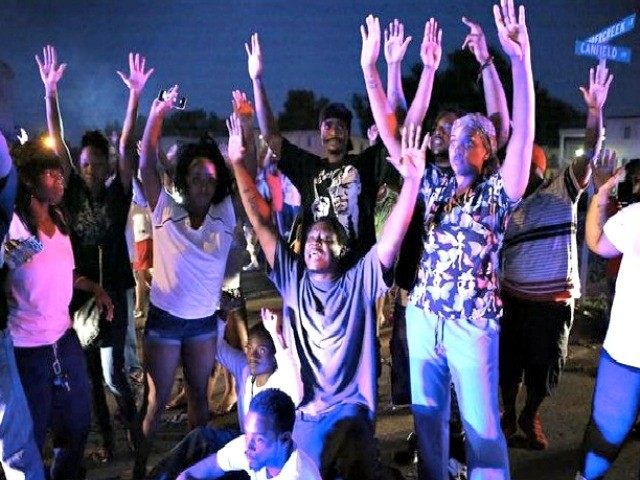CNN‘s Don Lemon hosted a panel of guests Thursday night to discuss the truth behind the “Hands up, don’t shoot” mantra adopted by Black Lives Matter protesters. Despite a lively discussion, CNN still does not seem to fully grasp the role it’s own misleading coverage played in suppressing the truth.
Lemon introduced the topic by running a segment narrated by CNN media reporter Brian Stelter. Stelter briefly chronicled the spread of the saying, starting with supposed eyewitnesses in Ferguson and followed by its symbolic adoption by CNN‘s own commentators, as well as football players and pop stars. The lead-in segment ended with Stelter pointing to the DOJ report which concluded “Hands up, don’t shoot” was not supported by the most accurate eyewitness accounts.
The panelists brought on to discuss the topic included Stelter, NY Times opinion writer Charles Blow, Kevin Jackson of The Black Sphere, Monifa Bandele of Communities United for Police Reform, and Criminology Professor David Klinger. Stelter, Jackson. and Klinger all agreed the facts were clear, i.e. “Hands up, don’t shoot” didn’t happen. Charles Blow tried to soften the impact a bit by suggesting the other DOJ report on police abuse of civil rights in Ferguson was the context for the report on the shooting. Nevertheless, Blow cited Malcolm X saying, “I am for truth no matter who tells it.” The implication, in context, was that the DOJ report on the Brown shooting had revealed a truth that people needed to accept.
Monifa Bandele was the only panelist who seemed prepared to deny the report’s conclusions, though even she began by claiming the mantra was about conveying a larger truth. “‘Hands up’ is the ultimate truth, and the reason why ‘hands up’ has gone viral across the country is because it’s a posture known to black people,” Bandele said. When pressed on the physical evidence in the report, Bandele suggested only a criminal trial could subject the evidence to sufficient scrutiny to determine the truth (another claim at odds with the contents of the DOJ report).
CNN made some serious mistakes on its Ferguson coverage, just as it did on its coverage of the Trayvon Martin case. To the network’s credit, last night’s panel showed some genuine willingness to correct the record and own up to some of its own mistakes. But hindsight, as they say, is 20/20.
It’s less clear that CNN is any less likely to make the same mistakes the next time a racially charged shooting takes place somewhere in America. If there is any hope of CNN doing better next time, it comes from something Brian Stelter said midway through the discussion:
The eyewitnesses that didn’t speak to the press, the ones that were intimidated. According to the DOJ, witnesses that didn’t want to come forward, those are the voices we didn’t hear in the news coverage. And that’s a lesson for journalists, that we weren’t hearing every witness’ point of view.
This is an important poin,t but Stelter doesn’t go nearly far enough with it. His statement makes the process of getting accurate information sound passive, as if the eyewitnesses who did and did not come forward did so independent of any outside concern or pressure. But the DOJ report makes clear there was an underlying connection between witness intimidation and bad reporting. Witnesses were already afraid to contradict those who were pushing “Hands up, don’t shoot,” but the media, CNN included, raised the stakes by amplifying that narrative across the airwaves. In other words, CNN‘s own flawed reporting exacerbated the problem and played a role in suppressing the truth.
That’s a lesson Don Lemon himself seems to have missed. Last August, when he was in Ferguson, he told viewers that there were rumors that there were many more witnesses who had not come forward because they were “afraid to speak out now.” But the interview Lemon ran with a Ferguson resident made clear he wasn’t talking about witnesses who feared spoiling the narrative being pushed by residents and CNN; he meant witnesses who feared the police. The DOJ report made clear that was not the fear that prevented reliable witnesses from coming forward.
The genuine fear experienced by witnesses is an aspect of the story which, until Stelter mentioned it Thursday night, has received scant coverage from the media. Maybe that’s because it so clearly implicates the networks who ran with the bogus story in the first place. It’s a topic that needs to be talked about more widely if CNN and others are to have any hope of avoiding the same pitfalls when covering similar racially explosive stories in the future.
Note: This version of the panel has been edited for length.
Follow John Sexton on Twitter.

COMMENTS
Please let us know if you're having issues with commenting.